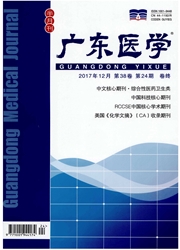

 中文摘要:
中文摘要:
目的探讨冠心病患者生命质量/患者报告结局影响因素,为提高冠心病患者的生命质量提供科学依据。方法采用SF-36量表对冠心病患者生命质量/患者报告结局进行测定,收集123例冠心病患者的生命质量资料,应用统计描述、t检验、方差分析、多元逐步回归方法分析冠心病患者生命质量/患者报告结局的影响因素。结果在单因素分析中,性别对生理功能、精神健康有统计学意义(P〈0.05),年龄对生理功能、生命力、躯体综合组分有统计学意义(P〈0.01),民族对生理职能有统计学意义(P〈0.05),文化程度对MH有统计学意义(P〈0.05),经济状况对PF、VT有统计学意义(P〈0.05),医疗形式对生理功能、躯体疼痛、一般健康状况和躯体综合组分有统计学意义(P〈0.05);多元回归分析中,年龄、职业和医疗形式在躯体综合组份上有影响,其回归系数为-8.99、-6.68和-12.18,文化程度在心理综合组份上有影响,其回归系数为2.33。结论性别、年龄、民族、职业、经济状况和医疗形式是影响躯体健康方面的重要因素,性别、年龄、经济状况和文化程度是影响心理健康方面的重要因素。
 英文摘要:
英文摘要:
Objective To investigate influencing factors of quality of life/ patient- reported outcomes among patients with coronary heart disease for the improvement of quality of life / patient- reported outcomes. Methods The SF-36 questionnaire was used to measure the quality of life / patient- reported outcomes in 123 patients with coronary heart disease. Statistical description,t test,analysis of variance and stepwise multiple regression were applied to analyze their influencing factors. Results In univariate analysis,sex was found to significantly affect PF and MH( P〈0. 05). Age significantly affects PF,VT and PCS( P〈0. 01). Ethnicity significantly affects RP( P〈0. 05). Education level significantly affects MH( P〈0. 05). Occupation significantly affects PF and PCS( P〈0. 05). Economic status significantly affects PF and VT( P〈0. 05). Medical modalities significantly affect PF,BP,GH and PCS( P〈0. 05). In multiple regression analysis,age and medical modalities were found to affect physical comprehensive scores and the regression coefficients were- 8. 99,- 6. 68 and- 12. 18,respectively. Education was found to affect mental comprehensive scores and the regression coefficient was 2. 33. Conclusion Sex,age,nation,occupation,economic status and medical modalities are important influencing factors of physical health; while sex,age,economic conditions and education are important influencing factors of mental health.
 同期刊论文项目
同期刊论文项目
 同项目期刊论文
同项目期刊论文
 期刊信息
期刊信息
